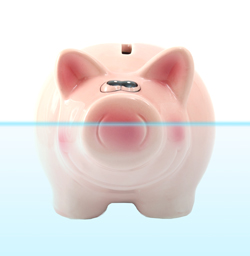BUSINESS
Bankruptcy
What You Want to Know
May, 2010 - Issue #67
 |
Commencing a Chapter 13 Case
A Chapter 13 bankruptcy case begins with the filing of a bankruptcy petition. An automatic stay prohibits creditors from taking any further action to collect or enforce a debt. Schedules of personal and real property, exemptions, priority debt (taxes, domestic support obligations, etc.), secured debt, unsecured debt, income and expenses must be filed. A Statement of Financial Affairs discloses income over the last three years, transfers, repossessions, seizures made within two years (most trustees will ask over the last four years), and interests in any corporate or business entities.
Chapter 13 Trustee and Creditors
Unlike Chapter 7 trustees, Chapter 13 trustees are not empowered to liquidate assets, but rather will evaluate asset values along with income and expenses to determine the plan payment. Mortgage lenders and auto finance companies require continued payments to retain property. Loans secured by a residence that are at least partially secured cannot be modified by the court; only with consent of lender.
Who May Be a Debtor and Debtor's Duties
Chapter 13 is for people facing financial difficulty and gives them an opportunity to cure defaults to their mortgage lender, or repay property, payroll or income taxes. Generally, unsecured debt cannot exceed $360,525 and secured debt cannot exceed $1,081,500. If the amount of debt exceeds these amounts, a debtor may be forced to file a Chapter 11 case to save property.
Before filing, a debtor must complete credit counseling and, after, financial management to receive a discharge. Beginning each month after commencement of the Chapter 13, debtors must begin making regular monthly payments on the first mortgage, as well to the second mortgage until the court orders otherwise.
The Chapter 13 Plan
A Chapter 13 repayment plan sets the amount to be paid over 36 to 60 months. Depending upon the court, plan payments may be for as little as 0 percent to general unsecured creditors. Conditions to court approval of a Chapter 13 plan include: submitting tax returns, proof of income, proof of monthly expenses, evidence of insurance, as well as plan payments. Generally, after all plan payments are made a discharge may be received and, if the junior mortgage is deemed wholly undersecured, it may be avoided (stripped).
Advantages of Chapter 13
Chapter 13 gives debtors the opportunity to retain their home, as long as regular monthly payments and plan payments are made. Wholly undersecured junior mortgages and liens may be removed from title upon entry of Chapter 13 discharge.
Foreclosures, seizures, garnishments, levies and collection efforts are stayed, and are permanently enjoined (prevented from collection) after the discharge.
By Certified Bankruptcy Specialist Louis J. Esbin, Esq. of Law Offices of Louis J. Esbin 254-5050.
Coping with Personal and Professional Stress
The longer you ignore distress without relief, the more serious the warning signals are likely to become. Here are some techniques, attitudes and ways of reacting that can help you manage stress.
Emphasize the positive.
You are what you think. Choose thoughts that help you create a positive attitude. On a daily basis, make the decision to stop judging yourself (and others). Learn to let go of thoughts that cause you discomfort or anxiety.
Avoid minor hassles.
Does it really matter if someone cuts ahead of you in line? Slow down, give yourself more time.
Set priorities and organize time.
Don't bite off more than you can chew. Learn to set limits. Don't take on more commitments than you can handle. Say "no" politely when appropriate.
Exercise.
Aerobic exercise is a powerful way to help control stress. Walking, jogging, bicycling and swimming are excellent forms of aerobic exercise. However, before beginning any new exercise regime, it is imperative that you check with your physician.
Eat well.
The foods you eat have an enormous impact on your body. Eat nutritious meals, drink six to eight glasses of water each day and avoid excessive calories. Also, go easy on alcohol, fatty foods, sugar and caffeine. Consult with your physician before making any changes to your diet or exercise program.
Talk about what's bothering you.
A problem shared is cut in half. Talking things over with people you trust can help you gain perspective. It can cut a problem that seems insurmountable down to a manageable size.
Tips courtesy of Peter R. Roca of Genworth Life Insurance Company 713-5381.
For People in Debt
Break Away from Fear and take Action
Stop letting fear dictate your life. Many folks who are drowning in debt find themselves paralyzed by fear and anxiety. It's really a fear of the unknown. "Will I lose my house? Do I need to file for bankruptcy? Do I need to cash out my retirement? Are we going to make it?" Instead of having solid answers to these questions, most people lose sleep wondering about all the "what ifs..." Stop making yourself sick. A professional debt consultant can help you answer these questions and create a manageable plan of attack to start rebuilding your life debt free. It's a simple process, and one that starts with a brief phone call to schedule a comfortable, stress-free visit with a bankruptcy lawyer. Bring in your creditor lists and/or statements, last few months' pay stubs and a few other items. We'll discuss your financial situation for about 15 minutes, then review all of your options on how you may want to get out of debt - considering the upsides and possible drawbacks of each one. Among your options is bankruptcy, but it's not the only one. It should be a last resort, and therefore we will recommend bankruptcy only when it is the best solution to your individual debt problem. You'll leave the office with the knowledge - and a plan - to take back your life.
By Hale Andrew Antico of SCV Bankruptcy 252-9900.
|
||||||||||||||||||||||||||||




